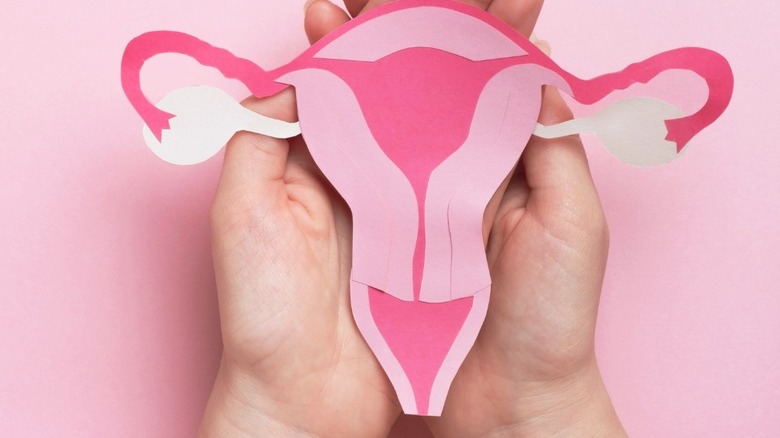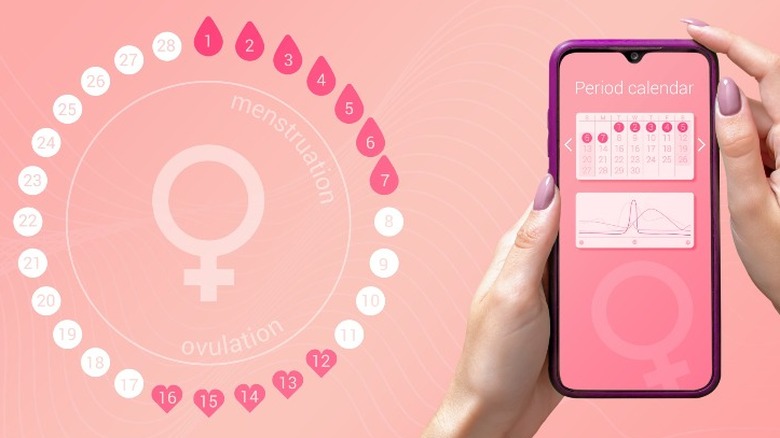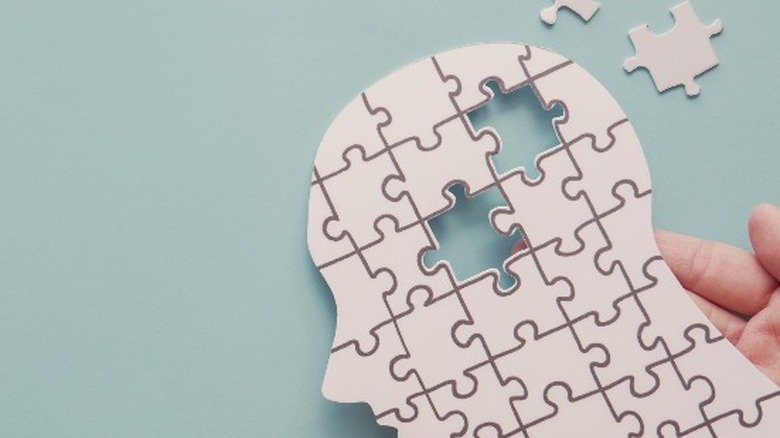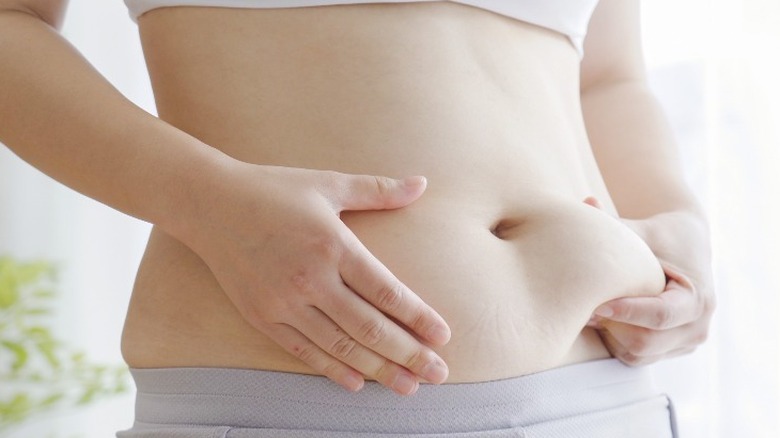The Effects Estrogen Has On Your Body
Hormones are chemical messengers that send signals throughout the human body to carry out different functions that are essential for development, reproduction, metabolism, mood, and more (via Cleveland Clinic). These hormones are mainly produced in the endocrine glands, testes, and ovaries, and can have significant effects on a person's body and mind (per MedlinePlus).
One of these hormones is estrogen, which is vital to women's sexual and reproductive health and various bodily processes in both female and male bodies (per Medical News Today). Along with progesterone, estrogen is a vital sex hormone that fluctuates throughout a woman's lifetime. According to an article published in StatPearls, estrogen is responsible for stimulating the growth of female sexual characteristics (such as fuller breasts and wider hips), and maturing the reproductive organs during puberty. As estrogen levels rise and fall, females experience other life stages, including ovulation, conception, and menopause (via Medical News Today).
However, there are many different ways that estrogen can impact the body — some of which you may find surprising. Here's how this powerful hormone plays an integral role in your health and what effects it can have on the body.
Different types of estrogen
Before getting into how estrogen affects the body, it's important to understand the three types of estrogen and how they differ. As explained by the Endocrine Society, the three estrogen types include estrone, estradiol, and estriol.
Estrone (E1) is the type of estrogen primarily found in women's bodies after menopause. In fact, it's the only form of estrogen a postmenopausal female body will produce naturally (per Cleveland Clinic). While it isn't as powerful as other types of estrogen, it's still essential for sexual and reproductive health. The body can convert estrone into estradiol when necessary to maintain reproductive processes.
Estradiol (E2) is the most common type of estrogen found in women during childbearing years (via Endocrine Society). It promotes a healthy reproductive system and its functions while controlling the menstrual cycle. Males also have lower levels of this hormone to aid in several bodily functions (per Endocrine Society).
Estriol (E3) is a special form of estrogen mainly present in females during pregnancy (via Cleveland Clinic). Its primary purpose is to maintain the health of the uterus and baby while preparing the body for labor, delivery, and breastfeeding. It reaches its peak about three weeks before childbirth.
Estrogen regulates the menstrual cycle
According to educational material by Endotext, the menstrual cycle is a 28-day interval that involves several changes in a woman's reproductive system in response to hormones released by the body. Estrogen is a crucial hormone in this process, helping to stimulate the growth of ovarian follicles, ovulation, and the shedding of the uterus lining if pregnancy does not occur (via UCSF Health).
For women of childbearing age, menstruation is an essential part of reproductive health. According to Healthline, the female body prepares the uterus for pregnancy about once a month. During this time, the uterus lining thickens as the ovaries release an egg for fertilization. However, if a pregnancy does not result during these few days within the menstrual cycle, estrogen and progesterone levels will fall and signal the body to begin menstruation.
Also referred to as a woman's period, menstruation involves the uterus shedding the thickened lining it produced to support a pregnancy. Because the body no longer needs the uterus lining or unfertilized egg, they are passed through the vagina, along with blood, for about four to five days (via Healthline).
Imbalances in estrogen levels during these cycles can result in menstrual irregularities and disorders. A study published in the International Journal of Endocrinology and Metabolism found that several menstrual disorders involving irregular cycles, heavy bleeding, or missed periods were connected to increased or decreased levels of estrogen.
Estrogen helps maintain strong bones
Another way estrogen can affect the body is in the bones. According to the Endocrine Society, estrogen slows down the natural bone lifecycle, which prevents bones from becoming weaker too quickly. During and after menopause, the rate of bone loss increases as estrogen levels drop.
Several studies, including this study published in Osteoporosis International, have explored the possibilities of estrogen as a treatment for low bone mineral density (BMD). According to the research, women's estrogen levels decline after menopause, resulting in decreased BMD, osteoporosis, and a heightened risk of bone fractures. A clinical review in Steroids noted that women who underwent estrogen and estrogen plus progestin treatments for declining BMD after menopause saw significant risk reductions in hip fractures and other types of bone fractures.
Likewise, research in Nature Reviews Endocrinology shows evidence that men with low levels of estradiol, which is a type of estrogen, have increased rates of bone loss, fractures, and delayed bone maturation. The article suggests that estrogen is an essential hormone for both men and women when it comes to regulating bone health.
Estrogen helps to prevent signs of skin aging
It's natural to face challenges as you age, including changes to the skin. Exposure to environmental factors combined with genetics, nutrition, and lifestyle eventually causes the skin to lose moisture and pigment, become wrinkled, and start to sag (per MedlinePlus). The elastin and collagen fibers and connective tissues in the skin decrease, resulting in thinner, less flexible skin. Other signs of skin aging include age spots, dry patches, increased risk of bruising, and other skin blemishes in sun-exposed areas.
One reason postmenopausal women experience skin aging is a drop in estrogen. As explained in an article in the American Journal of Clinical Dermatology, estrogen prevents skin collagen from decreasing, which helps support thicker skin. The research also shows that estrogen is essential for maintaining the skin's moisture levels with increased acid mucopolysaccharides and hyaluronic acid levels. Moreover, sebum levels were higher in women receiving estrogen therapy, which keeps the skin moisturized by preventing water loss and protecting against harmful pathogens (per Medical News Today).
There are topical estrogen treatments on the market that may help with skin elasticity, decrease wrinkling, and prevent some signs of aging in the skin, as shared in an article published in Clinical Interventions in Aging. However, it's important to talk to your doctor about hormone therapy for your skin as a possible option for you. You may be more at risk of negative effects from estrogen therapy (per Mayo Clinic).
How estrogen boosts fertility
Many people find it difficult to become pregnant. In fact, research shows that between 10% and 15% of couples in the United States are infertile (via Mayo Clinic). There are several reasons that can make it more challenging for a couple to conceive naturally, including age, health conditions, genetic disorders, substance abuse, stress, weight issues, exposure to toxins, and some cancer treatments (per Cleveland Clinic). However, a doctor may recommend treatments for infertility that could increase a woman's chances of becoming pregnant.
According to an article published by the University of Utah Health, estrogen is the most common hormone used in fertility therapy. Estrogen influences how thick the uterus lining becomes and the possibility of a fertilized egg implanting in that lining. Women receive estrogen for infertility to help balance out the levels of this essential reproductive hormone, which could increase the chances of conceiving and supporting the pregnancy.
Another study published in the Journal of Assisted Reproduction and Genetics shows that women who were treated with estrogen prior to in vitro fertilization (IVF) had improved outcomes when compared to those with no estrogen pre-treatment. The results also confirmed that the women who received the estrogen therapy had a significantly higher number of eggs retrieved and fertilized than the control group.
Estrogen promotes memory function
A more surprising way that estrogen can impact the body is memory function. According to the American Psychology Association, research supports that estrogen may protect against the natural cognitive decline that comes with aging. The article adds that estrogen may even lower the risk of developing Alzheimer's disease and provide protection from cognitive-related symptoms of the condition. However, it doesn't appear to reverse the disease after it has progressed.
There is an established connection between memory loss and decreased estrogen levels, which puts post-menopausal women at risk of memory issues, as explained in an article from the University of Wisconsin-Milwaukee. Estrogen improves brain processes used to function, communicate, and form longer-lasting memories. The decline in estrogen after menopause often leads to memory problems.
Harvard Health Publishing also shared research that confirms how crucial estradiol, a type of estrogen, is to memory performance and cognitive function. While women generally perform better than men when tested for verbal memory after puberty and during childbearing age, that is no longer the case after menopause.
However, estrogen treatment for memory loss due to menopause is not for everyone. Further research is needed to fully understand the effects of estrogen and how it can be most helpful for memory issues. Talk to your doctor to see if you may be a good candidate for estrogen-related therapy for your memory loss.
It stimulates libido in women
According to Sutter Health, about one in 10 women have low sex drives, which is defined as a lack of sexual thoughts or desire that causes personal distress (via Mayo Clinic). Depending on what causes a lack of sexual desire in these individuals, there are treatments that may help to stimulate the sex drive and improve libido, including hormone therapy.
Estrogen can have a powerful effect on a woman's sexual desire (per Medical News Today). Higher levels of estrogen can improve a female's libido and promote vaginal lubrication, which can increase arousal and pleasure from intercourse (via International Society for Sexual Medicine). Vaginal dryness or shrinking is one way that menopause affects the body, which can make sex uncomfortable or even painful. That alone could be a reason for reduced sexual desire.
Estrogen therapy for low sex drive can help to improve some of the symptoms that contribute to decreased libido in women (via Mayo Clinic). Your doctor may recommend estrogen pills, patches, vaginal creams, sprays, or slow-releasing vaginal rings to help with sexual function and desire. However, these hormone treatments are not designed to treat depression, anxiety, or other mood disorders that are affecting your sex drive.
The hormone can protect the heart from damage
Some studies have shown that estrogen can have positive effects on the cardiovascular system, including the heart and blood vessels (per Cleveland Clinic). Estrogen increases the good type of cholesterol while reducing the bad type of cholesterol, dilates blood vessels to improve blood flow, and absorbs harmful free radicals in the blood.
While women typically develop heart disease later than men, their risk increases when estrogen levels fall after menopause (via Cleveland Clinic). The decline in estrogen means LDL cholesterol goes up, resulting in more fat and cholesterol buildup in the arteries. According to the Centers for Disease Control and Prevention (CDC), these factors increase the risk of a possible heart attack or stroke.
Although most people typically associate estrogen with the sexual and reproductive systems, several parts of the body have estrogen receptors, including the heart (via Endocrine Web). In particular, estradiol, which is produced in the ovaries, seems to provide protection to the heart the most. Women who had elective surgeries to remove their ovaries and uterus before menopause were able to benefit from estrogen therapy with lowered risk of heart disease up until the age of natural menopause.
However, hormone replacement therapy involving estrogen and heart health can have negative effects if administered after menopause (via Cleveland Clinic). Talk to your healthcare provider to see if you might be a good candidate for this type of protective treatment.
Estrogen causes mood changes
Estrogen has long been connected to women's emotional health and mood (via WebMD). Changes in the levels of estrogen or imbalances can be linked to several disruptions in regular mood patterns, including premenstrual syndrome (PMS) and postpartum depression. In addition, estrogen can disrupt moods by affecting the parts of the brain that control and regulate emotions (per WebMD).
According to the Endocrine Society, estrogen influences serotonin production, which is a neurotransmitter that helps to regulate moods. When serotonin levels are disrupted due to decreased estrogen during menopause, it can result in mood swings or a sudden intense change in emotion (via Medical News Today).
Moreover, depression is a common occurrence during menopause (per Endocrine Society). Depression and anxiety can affect sleep patterns, which can also affect a person's mood. If you're experiencing depression or sudden changes in your mood, speak to your doctor about your symptoms. Fluctuating estrogen levels may be contributing to these disruptions.
Estrogen strengthens the urinary tracts
A review in Menopause International shares how women's genitals and urinary tracts share developmental elements, which make both systems sensitive to female sex hormones, including estrogen. There are estrogen receptors throughout the lower urinary tract, including the urethra, bladder, and muscles in the pelvic floor. Research shows that a drop in estrogen after menopause often leads to issues in the urinary tract, such as the need to urinate more frequently, a feeling of urgency, and urinary incontinence.
Medical News Today also shares how low estrogen levels can result in the thinning of the genital lining, called genitourinary syndrome of menopause (GSM). One of the symptoms of GSM is bladder dysfunction, which causes urinary discomfort, the inability to hold in urine, and other issues.
Likewise, other life changes that cause a drop in estrogen can also lead to bladder dysfunction (via Medical News Today). For example, women who have just given birth or are breastfeeding may experience a decline in estrogen levels that contribute to urinary tract issues.
It's important to understand that there are several causes for bladder dysfunction and other problems with the urinary tract. While low estrogen may be linked to your situation, you should always consult with a medical professional to get the right diagnosis and treatment for your condition.
Estrogen regulates metabolism and weight
While many people may struggle with weight issues throughout their lifetime, post-menopausal women typically experience weight gain around their abdomen or mid-section (via Medical News Today). This type of weight gain is connected to a drop in estrogen, which is a hormone that helps regulate metabolism. As a result, women who have gone through menopause are likely to gain weight as their estrogen levels fall.
A review published in Endocrine Reviews also shares how estrogen can have a significant effect on metabolism and weight. The research shows how estrogen actions can impact several functions in the body that influence weight, including the hypothalamic nuclei, which controls food intake and energy expenditure, and insulin sensitivity in the liver, skeletal muscles, immune cells, and more. The review also notes that a deficiency in estrogen is linked to metabolic dysfunctions and risk of obesity and type 2 diabetes.
Some evidence has shown that hormone therapy with estrogen can help to control body weight by increasing resting metabolic rate and promoting more effective use of starches and blood sugars (via WebMD).
It increases blood clotting factors
Blood clots are a gel-like mass of blood made up of platelets, proteins, and blood cells that bind together to stop bleeding (per MedlinePlus). While these forms of blood clots are beneficial for the healing process, blood clots can sometimes happen in abnormal areas or the body doesn't break them down as expected. When this happens, it can lead to several dangerous conditions, including thrombosis, pulmonary embolism, stroke, heart attack, and kidney failure.
Although estrogen does not cause blood clots on its own, the hormone does increase clotting factors that can lead to dangerous blood clots (via National Blood Clot Alliance). Because many forms of hormonal birth control contain estrogen, there is often a risk of blood clots associated with using these birth control methods.
According to the Centers for Disease Control and Prevention (CDC), some women are more at risk for developing a blood clot than others. There may be an increased chance of harmful blood clots forming after surgery or hospitalization, during pregnancy, and having a family history of blood clots. Oral contraceptives with estrogen have been associated with blood clots since 1961, as explained in an article from Arteriosclerosis, Thrombosis, and Vascular Biology.
Estrogen and shifts in body temperature
If you've experienced hot flashes, you may have an idea of how quickly your body temperature can change and how it can impact your day-to-day routine. Hot flashes are actually a common occurrence during menopause while estrogen levels are changing (per Mayo Clinic). Around 75% of women experience sudden and periodic increases in body temperature while going through menopause (via Johns Hopkins Medicine).
A review published in Autonomic Neuroscience: Basic & Clinical explains how hot flashes are connected to changes in thermoregulation, or body temperature, caused by fluctuating reproductive hormones. Estrogen typically promotes lower body temperature and can influence heat dissipation, blood flow in the skin, and sweating.
When estrogen levels decrease due to menopause, the hypothalamus may sense that your body is too warm and creates a hot flash, which is designed to cool down the body (via Mayo Clinic). A sudden hot flash causes sweating, which helps to reduce the body's overall temperature (per Johns Hopkins Medicine).
Estrogen levels and changes in digestion
Both estrogen and progesterone can be connected to digestive health and gastrointestinal (GI) problems, including irritable bowel syndrome (IBS) (per WebMD). Although causes of IBS vary from person to person, the digestive system has estrogen receptors that use the hormone to regulate digestive processes. When there is a change in estrogen levels, it can impact how quickly food moves through the digestive tract, your pain threshold when experiencing stomach cramps, and inflammation in the gut.
An article in Health explains how hormone levels before and during your period can also have an effect on digestion and GI issues. Estrogen levels begin to rise after your period ends, which can speed up digestion, move food through the system too quickly, and result in diarrhea. On the other hand, menopause causes a decrease in estrogen, often resulting in bloating and constipation.
While not everybody will experience digestive issues due to fluctuations in estrogen, it's worth talking to your doctor about a possible connection. There may be ways to improve symptoms and treat the underlying cause of your GI discomfort.














